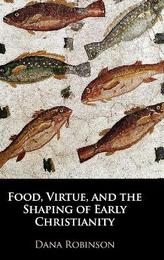
|
Food, Virtue, and the Shaping of Early Christianity
Hardback
Main Details
| Title |
Food, Virtue, and the Shaping of Early Christianity
|
| Authors and Contributors |
By (author) Dana Robinson
|
| Physical Properties |
| Format:Hardback | | Pages:257 | | Dimensions(mm): Height 160,Width 230 |
|
| Category/Genre | Religion - general
History of religion
Christian life and practice
Theology
Worship, rites and ceremonies |
|---|
| ISBN/Barcode |
9781108479479
|
| Classifications | Dewey:270.2 |
|---|
| Audience | | Professional & Vocational | |
|---|
| Illustrations |
Worked examples or Exercises
|
|
Publishing Details |
| Publisher |
Cambridge University Press
|
| Imprint |
Cambridge University Press
|
| Publication Date |
13 August 2020 |
| Publication Country |
United Kingdom
|
Description
In this book, Dana Robinson examines the role that food played in the Christianization of daily life in the fourth century CE. Early Christians used the food culture of the Hellenized Mediterranean world to create and debate compelling models of Christian virtue, and to project Christian ideology onto common domestic practices. Combining theoretical approaches from cognitive linguistics and space/place theory, Robinson shows how metaphors for piety, such as health, fruit, and sacrifice, relied on food-related domains of common knowledge (medicine, agriculture, votive ritual), which in turn generated sophisticated and accessible models of lay discipline and moral formation. She also demonstrates that Christian places and landscapes of piety were socially constructed through meals and food production networks that extended far beyond the Eucharist. Food culture, thus, provided a network of metaphorical concepts and spatial practices that allowed the lay faithful to participate in important debates over Christian living and community formation.
Author Biography
Dana Robinson earned her Ph.D. in Early Christian Studies at The Catholic University of America.
Reviews'I found this an engaging and subtle study with insights on every page. It consists of three case studies that move across the diverse linguistic, geographic and social space that early Christianity occupied.' Nathan Macdonald, The Journal of Ecclesiastical History
|